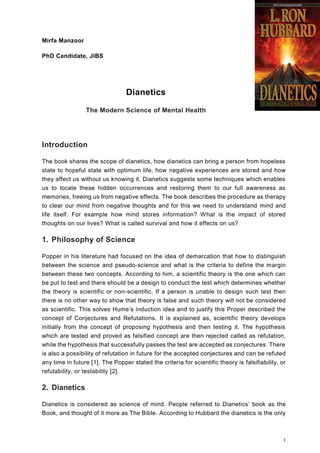The smart Trick of Dianetics That Nobody is Discussing
Table of ContentsDianetics for BeginnersDianetics Fundamentals ExplainedDianetics - An OverviewThe Buzz on Dianetics
I could not ever not want to receive anything that comes to mind for you- if it was otherwise, I wouldn't be sitting here with you, doing this. I not only can never ever have a problem, or not intend to hear something that comes to mind for you, however I'm entirely anxious to recognize every concept, every idea, every photo or sensation that emerges or materializes for you- do not ever before assume or else, and if somehow you do, please simply let me know! In some cases, you may have a thought, and photo, concept or case turn up that does not seem to answer the concern, or connect to it, yet however, always do tell me regarding it, and as we continue, the relevance will emerge for you.This is inherent in the basis of handling, and the subject of this discussion: the standard duties of the counselor and the customer: The standard duty of the therapist is, as opposed to "standard training", not to manage, which indicates to impose and/or inhibit, yet to instead work from the basis of EMPOWERING THE CUSTOMER.

8 Easy Facts About Dianetics Shown
John Mcmasters expressed this standard truth splendidly well in one of his lectures on Power handling, in which he clarifies exactly how he was asked what this "unique flair" was that he had for providing such terrific sessions; he needed to believe about that for a minute, and spotted that it was what he had not been doing, as well as what he was doing: he had not been reviewing, judging, computer, or in truth, creating any ideas, allow alone spoken expressions, after offering the command and while awaiting the computer to complete their solution to their fulfillment; he was, merely and just, existing with the PC, and completely interested.
The role of the counselor, showed; that was his "unique flair". I have actually had my very own experience which instructed me this well, very early in the video game. In 1982, having just recently finished my training and teaching fellowship on New Era Dianetics, I was running this on a COMPUTER, and there was a factor in the session where (being a little bit wet behind the ears not yet having many hours under my belt as a professional auditor) the PC seemed to be "taking too long" to express anything vocally after I gave him a command.
This secret transformed out to be one of the most valuable contribution that John ever made to the see page subject of therapy or bookkeeping (Dianetics). In my humble viewpoint, it is the biggest contribution that any individual has actually ever before made to these subjectsthe application is entirely non-judgemental, non-evaluative, and devoid of any kind of pointer, advice or opinion.no preconceived agenda for people, or 'levels' that they have to do
In Scientology we prided ourselves on not examining for people. All that really indicated was that the auditor did not VERBALLY review for the PC in session.
A Biased View of Dianetics

Anyone that had actually ever before seen John audit might not aid however discover an unique high quality in his bookkeeping."The client's standard role is to be there with the objective of relocating the instructions of their spiritual goals, and to freely and fully express and experience whatever materializes for them in addressing the questions and carrying out the instructions in the processing.
This is something to procedure as required. Likewise, individuals often have previous experience and/or brainwashing in auditing/processing which, in some means, and to some degrees, really deceives them into perspectives, ideas and habits patterns that prevent the full understanding of these roles, and so they will certainly often tend to inhibit the expressing of what comes to mind, as in the examples offered over - Dianetics. * The first, and maybe foremost examples of mis-indoctrination causing much less than completely smooth and effective sessions, can be discovered in particular aspects of the training routines, or "TR's":"TR's" are commonly a person's first, or at least early, experience in Scientology, and while I will certainly go on to discuss what I view as the imperfections in concept and method, nonetheless, often tend to be considerably therapeutic, done as they are offered (Hubbard insists that "TR's are not processing, linked here they are training", but factually, they are both processing AND training)
Alan Walter made comparable monitorings, and improved these with his "Visibility Processes". There is no "flunking", and no rejection of the fact of this being my company processing. The focus, as it should be, gets on experiencing the other person's presence. All the symptoms which get a "flunk" in doing "TR-0" are simply the being's initiatives to stand up to the various other individual's presence, and rather than being pestered and nagged with "Flunk", which enforces "failing!" on the being, one just requires to be urged to "stick their feet in the water a little much deeper", to significantly rehabilitate their capacity and willingness to totally share and experience "being here", or "presence", with others.
4 Simple Techniques For Dianetics
